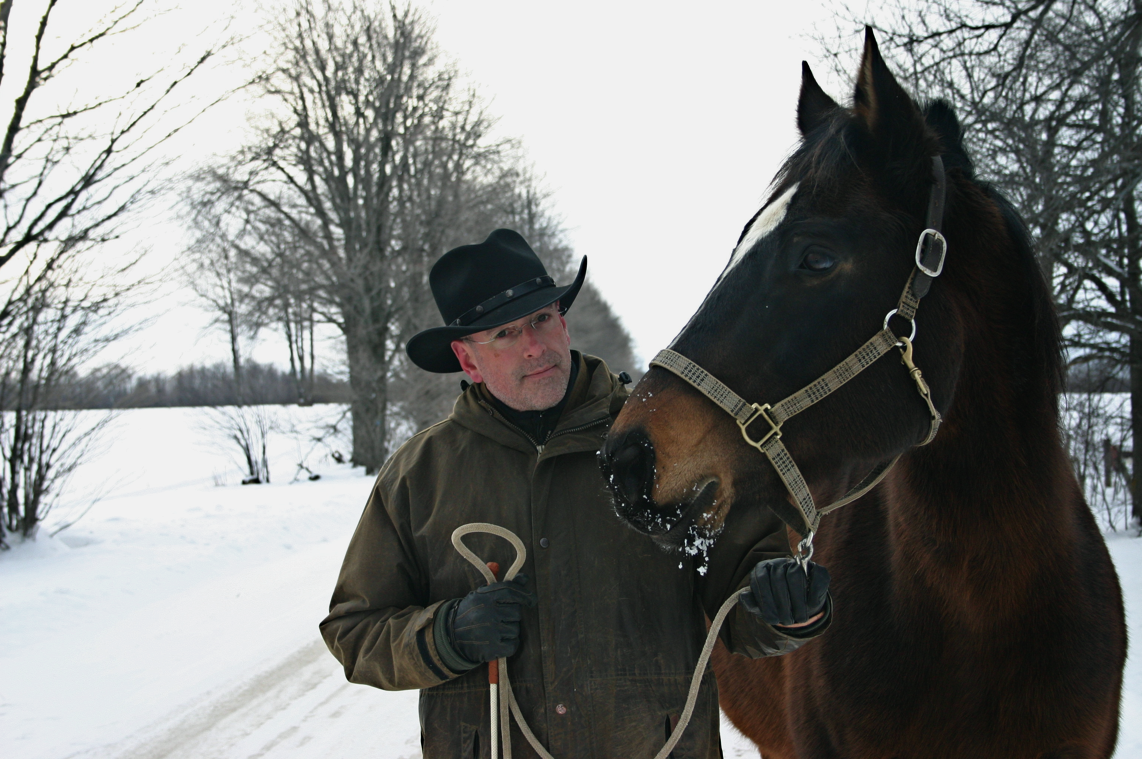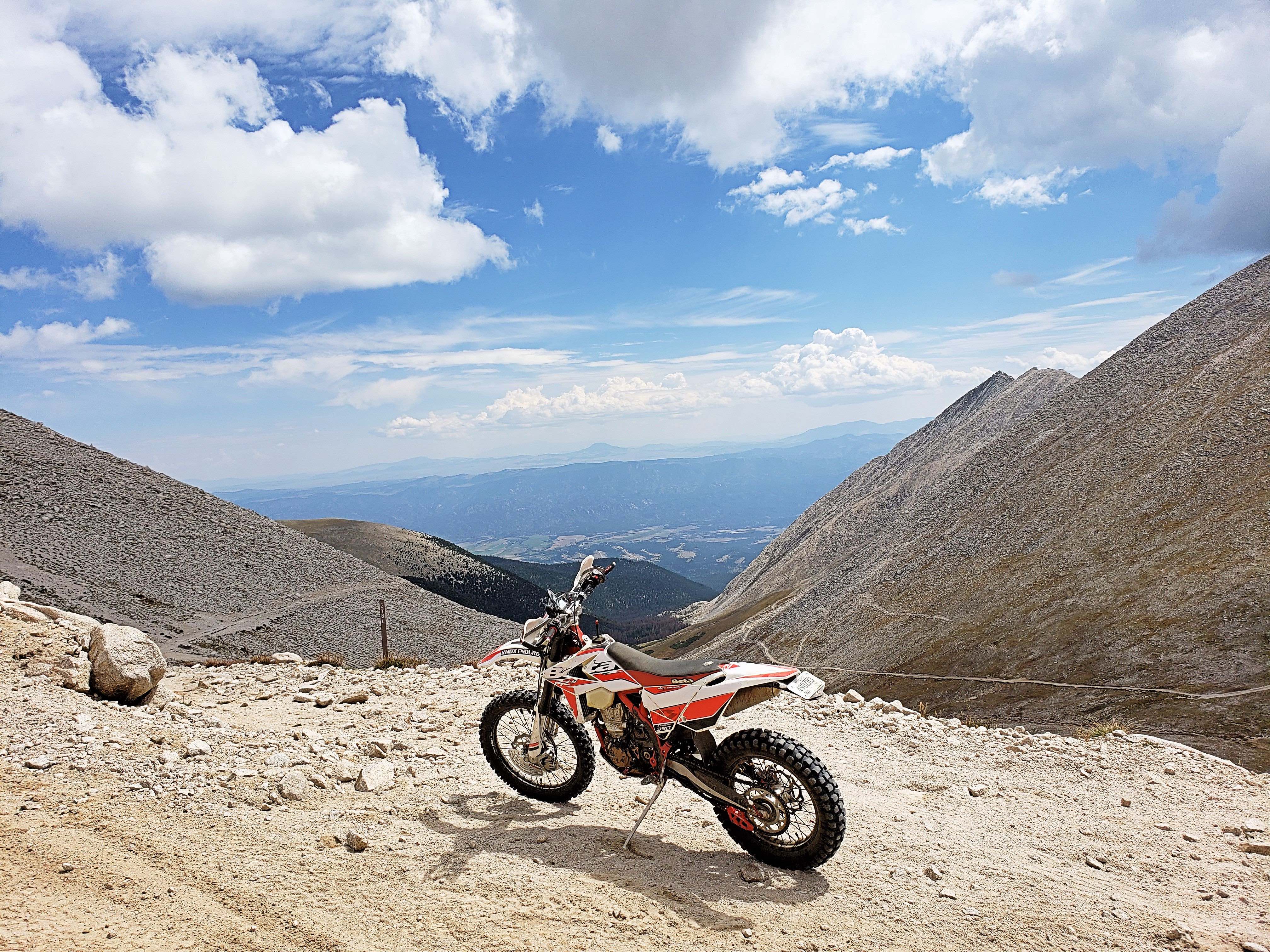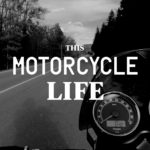Does riding motorcycles scare you? For more riders than we imagine, nagging fear is one part of motorcycling nobody talks about, and just feeling it can undermine our confidence. Meet Dr. Mark Barnes, a clinical psychologist who thinks that isn’t necessarily a bad thing, and he should know: Mark also happens to be an avid rider on road and off, and a veteran motorcycle journalist. In this conversation, Dr. Barnes talks about how controlling fear is a skill we can learn, how every rider feels it, and how just the right amount might be the secret to getting the most out of your motorcycle life.
Show Notes

Here I am with William, my last horse. His calm, patient way might just have made a horseman out of me in the long run, but fate had other plans. When we lost him, I found motorcycles again. As Mark Barnes says below, “Life is funny, at least with enough distance.” Photo by Lindan Courtemanche
I must confess that I had not previously invested the time to get to know Motorcycle Consumer News, but I’m impressed. If you don’t know it, a visit to their web site would be a good place to start.
Mark Barnes has published a book, which he graciously declined to talk about in service of this episode’s theme. It’s called “Why We Ride: A Psychologist Explains The Motorcyclist’s Mind, And The Love Affair Between Rider, Bike And Road.” It’s essentially an anthology of columns from MCN, and I’m very much enjoying it. Here’s a bit more about it, and one way to buy it.
In our conversation, Mark mentioned something called the Yerkes-Dodson Law. He was obviously paying attention in school, because it turns out that the study behind it is more than a century old. There is plenty to read online on this subject (including predictable efforts to debunk it… science can be a rough and tumble business). Wikipedia is a good start, if you’re curious. And this video also provides a pretty tidy explanation. It makes perfect sense to me, though… I can’t think of anything worthwhile I’ve ever done in my life that didn’t happen on a just-so bubble of ‘optimal anxiety’. Including this podcast.
Mark also mentioned a therapist named Brenda Bates, who treats riders suffering from PTSD after crashes. She has, indeed, written a book about this. Here it is on Amazon, along with a short bio of the accomplished Ms. Bates. A quick tour of Google suggests that this book has played an important role in a lot of riders’ lives. Perhaps most remarkable about her work is the fact that there are riders who love this so much that they’re willing to work this hard to come back. She might make an amazing podcast guest.
In an email exchange the day after our interview, Mark offered a coda to his story of being frozen with fear near the summit of Mt. Antero, and I’m sharing it below with his very kind permission. As I so often am by fellow riders, I’m humbled by his courage and honesty, here. I’d love to meet everyone I’ve interviewed for this podcast, but Mark Barnes surely has a special place on that list. Here in his own words is the rest of that story:

Mark’s bike on Mount Antera. This is the photo he was looking at as he shared that story.
“This morning I awoke with what can only be called a mild “flashback” of that harrowing trip up Mt. Antero that I should have labeled “Nightmare at 13,000 Feet” (an allusion to a famous Twilight Zone episode, if you’re too young to remember) [I’m not]. Recounting that event to you yesterday, albeit briefly, must have stirred up some PTSD within me that didn’t reach full intensity until the final feature in last night’s dream lineup. While pondering this fleeting phantasmagoric re-visitation, I realized the terror associated with that event exerted a (mostly) unnoticed influence on our dialog: I remember feeling like I’d lost my place after summarizing the story, but I couldn’t recall the point I’d set out to make. I had wanted to say a bit about what I ended up doing while waiting for my riding buddies to return from that final 1000-ft. leg to the top that I was unable to make, even though the remaining terrain was less difficult than what I’d already traversed – I was too locked up mentally (and therefore untrustworthy physically) from the protracted trauma of the ascent thus far. I now realize that just telling you that tale was enough to reactivate my right amygdala sufficiently to disrupt/freeze my cognitive flow and prevent me from following through with what I’d meant to say. This struck me as a perfect recreation of what had happened on the mountain. And it’s the kind of abstracted parallel we psychologists are always excited to discover.
Anyway, my truncated version of the story may have left you and listeners wondering how the hell I made it back down the mountain. If I was unable to proceed that final, relatively less treacherous, thousand feet, how could I possibly have gone back down all those many thousands of feet that had just rendered me paralyzed? Pausing where I did helped, in that it gave me a chance to do a variety of fear-management activities. I practiced some deliberate breathing exercises, no doubt rendered less effective by the altitude, but still useful. I came to grips with the shame and anxiety about being “that guy” in the group who fell below everyone else’s levels of courage, ability and achievement (and I’m still at peace with my decision to hang back). And it was soothing to simply stare out over the vastness of the surrounding landscape in that shockingly silent and isolated environment – not unlike looking out over the ocean from a deserted beach in its involuntarily calming effect on my psyche. Of course, there was one more consideration, the one you highlighted later in our discussion: there was absolutely no other choice. This was also true in the story from the Fearless article that you may have expected me to recount, since I think I labeled that one as the scariest experience in my motorcycling history. In that instance, I was as angry as I was terrified, because our being lost at nightfall was something that could have easily been avoided with more attentive navigation. That anger helped me rally and served as very powerful propulsion during my stretch of resurgent bravery and riding acumen. It may have been more accurate to call that one my all-time zenith of despair, rather than fear, although the fear factor was just a tiny tick behind. The Mt. Antero ordeal was definitely the most afraid I have ever been, including when I had to face highly invasive brain surgery a year prior to the Colorado trip. Ironically, I’d planned that trip as a celebratory counterpoint to the horrors of having my head opened up! Life is funny, at least with enough distance.”
Gary Saunders’ mesmerizing cover of “Don’t Fear The Reaper” is excerpted here with the artist’s kind permission. You can find this track on Soundcloud here. And if you want to say hello and tell him how much you liked it, here is his Facebook page.
Finally, some listeners may have noticed an annoying little crackle in their right headphone during this podcast. It wasn’t you, it was me. The audio input/output jack on my computer is wearing out and causing signal issues. I’m sorry… I’ll figure it out. Thanks for putting up with it.


Your podcasts are immensely enjoyable to listen to, during my NYC commute of 4 hrs/day. THe subjects are diverse, interviews are intelligent, reflective & everyone can take away something for themselves, their riding & their life. Thank you for treating this subject w/Mark’s discussion. TIp of the iceberg. The association of fear, excitement & courage are all tied together & its how we extract the important message & balance that is fulfilling. Love to hear more of these and keep up the great work!!! Much appreciated for your efforts.
Thank you so much for the comment, Michael, I really appreciate it. And I totally agree with you… besides being a fellow rider, Mark seems like a pretty high quality human being, and a lot of what he had to say about fear felt pretty universal. I enjoyed that conversation very much, and I’ll make sure he knows you did, too.